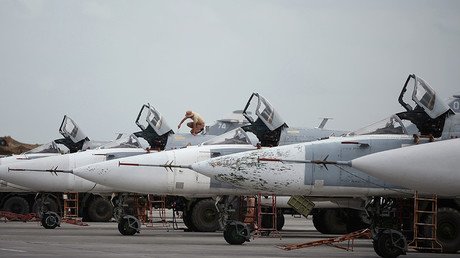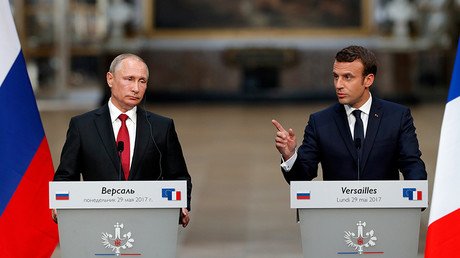France’s Macron sees no ‘legitimate successor’ to Assad, declares terrorism a common enemy in Syria
There is currently no viable alternative to Bashar Assad to prevent Syria from turning into a failed state, the new French president has said, departing from his predecessor’s position that the Syrian leader must be toppled to stabilize the war-torn country.
“The new perspective that I have had on this subject is that I have not stated that Bashar al-Assad’s departure is a pre-condition for everything because nobody has shown me a legitimate successor,” Emmanuel Macron said in an interview with eight European newspapers.
The new approach is seen as a stark departure from the political discourse of former French President Francois Hollande, who openly advocated for regime change in Syria. Under Hollande’s leadership, France was ready to support the US to strike Damascus in the autumn of 2013, until Moscow stepped in to de-escalate tensions while also ensuring the liquidation of the Syrian chemical stockpile.
“Assad is the origin of this problem, and cannot be part of the solution,” Hollande told the UN General Assembly in 2015.
Macron says French policy towards Syria is now more aligned with Russian objectives in the country. “My lines are clear: Firstly, a complete fight against all the terrorist groups. They are our enemies,” he said. “We need everybody’s cooperation, especially Russia, to eradicate them.”
Macron said he will not allow US “neo-conservatism” to seep into France, and that the focus of French policy will be aimed at achieving “stability” in Syria, rather than getting dragged into a Libya-style conflict.
“What was the outcome of these interventions? Failed states in which terrorist groups flourished. I do not want that in Syria,” the French leader emphasized.
READ MORE: Putin, Macron meet in Versailles on 300th anniversary of Tsar Peter’s visit to France
While adopting a more flexible approach to the Syrian conflict, Macron warned of red lines beyond which Paris would be ready to seek direct military intervention against Damascus.
“If it is proven that chemical weapons are used on the ground and we can trace their provenance,” Macron said France will conduct unilateral strikes “to destroy the stocks of identified chemical weapons.”
“France will, therefore, be completely aligned with the United States on this,” Macron added, referring to the unilateral American strike on Shayrat Air Base in April – the US’ response to an alleged chemical weapons attack in Idlib that was swiftly pinned on Damascus.
However, the 39-year-old French leader noted that he shares “convergent views” with Russian President Vladimir Putin who is “obsessed” with “fighting terrorism and avoiding a failed state” in Syria.
“I respect Vladimir Putin. I had a constructive exchange with him. We have real disagreements, on Ukraine in particular, but he has seen my position,” Macron said. He welcomed constructive dialogue with Moscow and said he is optimistic about cooperation between the two countries.
The French president made clear that France’s domestic security is directly linked to the ongoing war in Syria, as recent terrorist attacks in France, which killed over 230 people, were fueled by IS ideology which flourished amid the ongoing armed conflict.
“My deep conviction is that there needs to be a diplomatic and political roadmap. We won’t solve the question only with military force. That is a collective error we have made,” he said, reiterating Moscow’s long-standing policy towards Syria since the start of the conflict in 2011.














